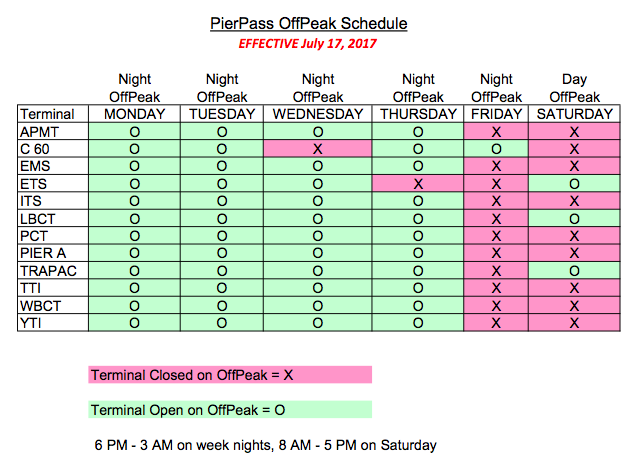LONG BEACH, Calif., July 21, 2020 – PierPass Inc. announced that its OffPeak Program has taken 48 million truck trips out of daytime Southern California traffic since the program’s inception in July 2005. OffPeak reduces cargo-related congestion and pollution in and around the Ports of Los Angeles and Long Beach by diverting truck trips to night and Saturday shifts funded by the program.
The number of annual truck trips to and from the ports rose 20% between 2005 and 2019, a period that saw no significant expansion of nearby highway capacity.
“The PierPass OffPeak program has helped the LA/LB ports continue operating as a major source of jobs in Southern California,” said Congressman Alan Lowenthal. “I was very proud to spearhead the legislative effort that led both to the creation of PierPass and to extended hours at the ports.”
The OffPeak Program established regular night and Saturday work shifts at the two adjacent ports. The expanded shifts are primarily funded by a Traffic Mitigation Fee (TMF) levied on loaded containers entering and exiting the ports by truck.
Because there is no fee on intermodal cargo (containers leaving or arriving by rail), the TMF is paid by cargo headed for Southern California and other nearby destinations. For example, containers arriving from Asia and leaving the ports by rail to other parts of the U.S. don’t pay the TMF.
“PierPass is a prime example of the private sector joining together to take coordinated action to address the needs of the goods movement industry and the needs of the community,” Rep. Lowenthal added. “Their OffPeak program has helped our economy, our workers, and the health of our residents.”
The OffPeak Program was restructured in November 2018 after an 18-month process of consultation with industry stakeholders, and an analysis and survey by industry consultants. The revised program, informally called “PierPass 2.0,” reduces traffic congestion by spreading cargo movement across two shifts using appointments.
Heavy-duty trucks are the largest source of smog-forming nitrogen oxide emissions and toxic diesel exhaust in the region. By decreasing the time that trucks are idling and stuck in traffic, the OffPeak program has also helped to improve air quality.
“The severe traffic impacts caused by cargo movement in the pre-PierPass era of daytime-only operation is becoming a distant memory,” said PierPass President John Cushing. “The program has enabled Southern California’s distribution centers and warehouses to regularly operate a second shift, and has been a model for other ports around the country that have created their own programs for extended gates.”

